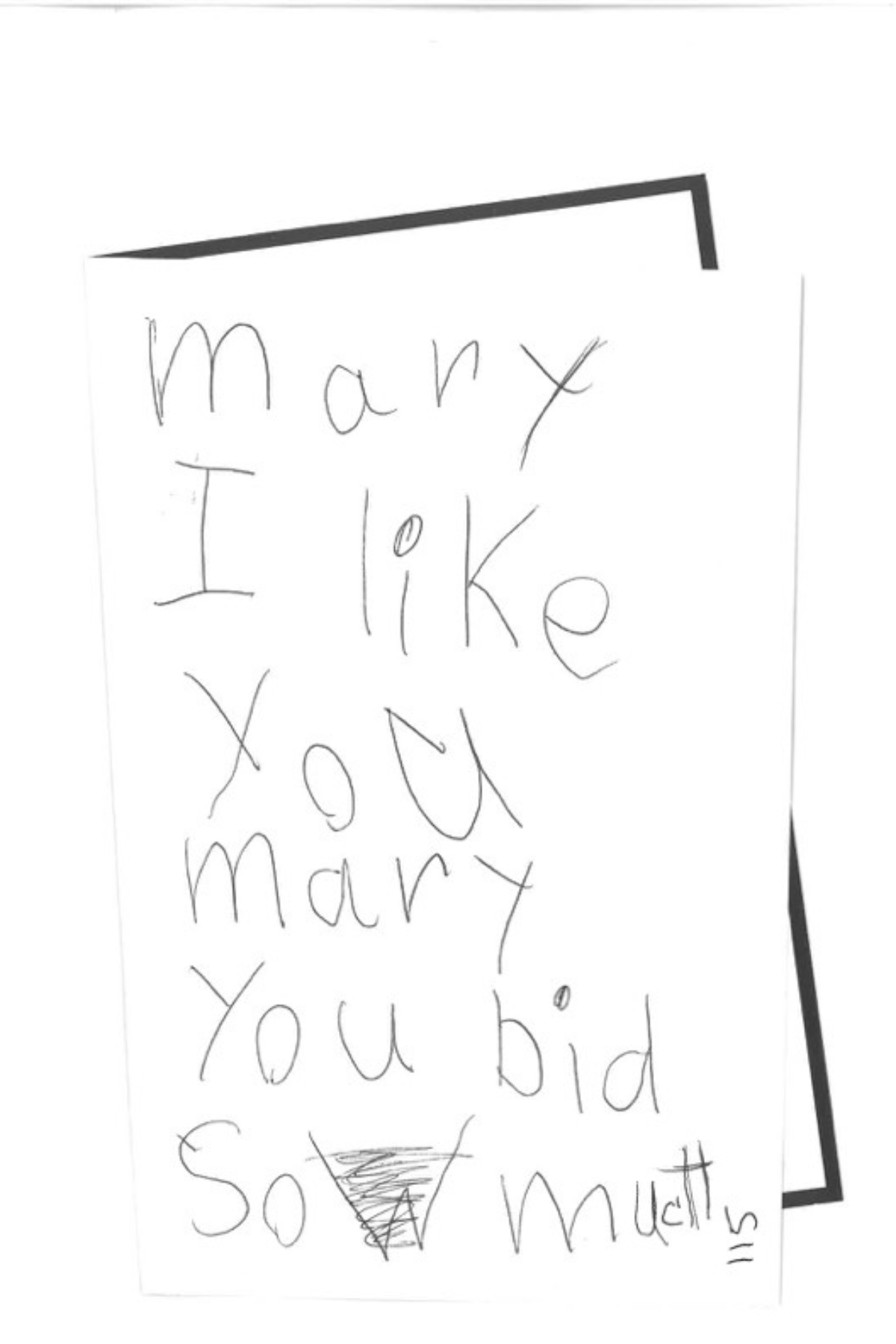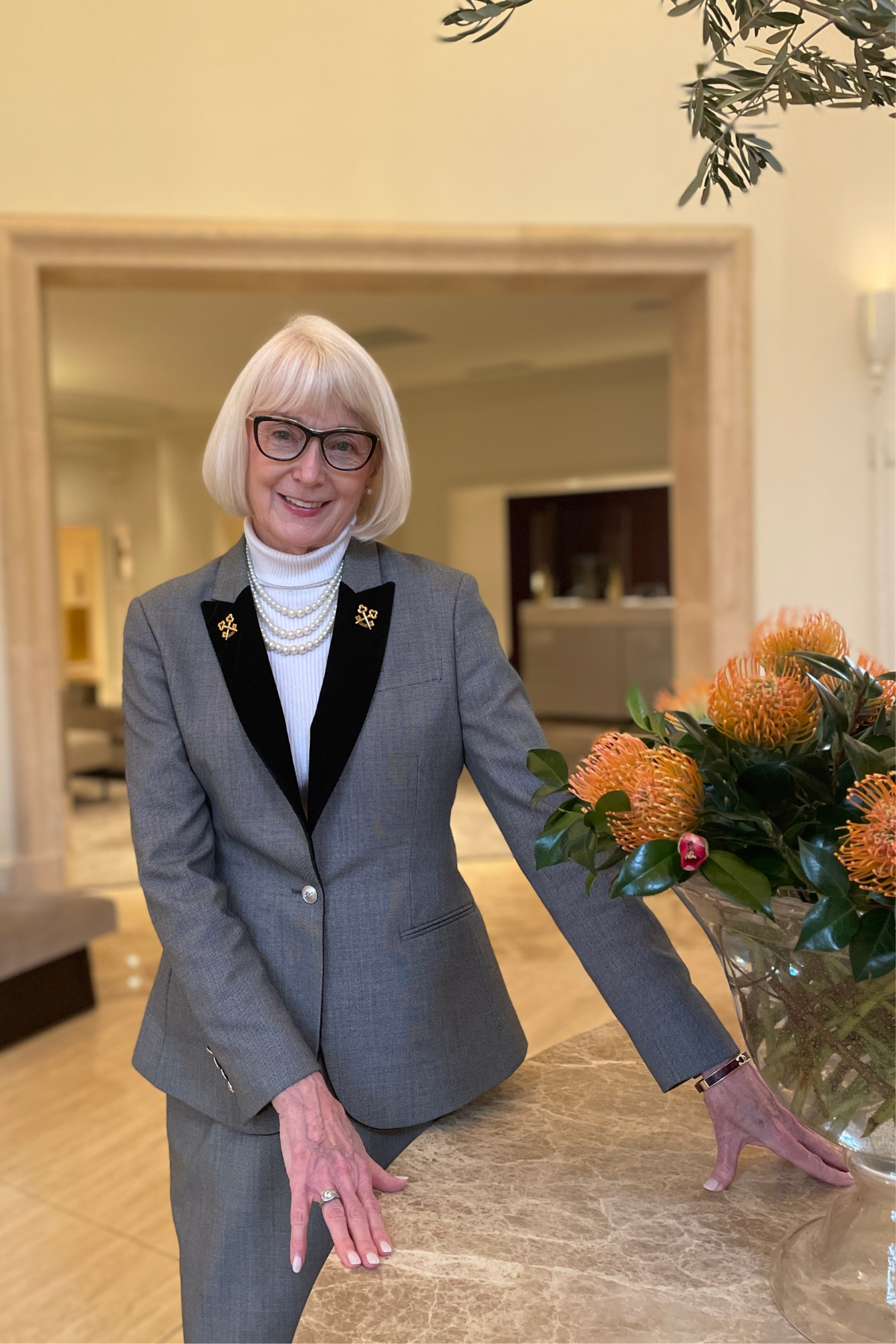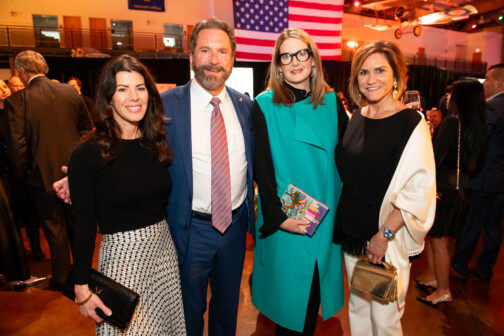Mary Stamm was born a concierge, even if she didn’t realize what that meant. This year, she celebrated her 40th anniversary at the Rosewood Mansion on Turtle Creek. But it started when she was a kid, planning her family’s vacations. The Wisconsinite would regularly look up restaurant menus and theater schedules on her family sojourns.
And she always loved hotels. Once, while staying at the Dearborn Inn in Detroit, she was shocked when the hotel sent a fruit basket to her family’s room. Another time, while visiting New York City, she convinced her parents to let her people watch in the hotel lobby. (“Lobbies have a life of their own,” she says). There, she saw the King Family, a popular musical group in the 1960s, walk through. She gasped.
And so when Stamm grew up, she began working in hotels. First was the Pfister Hotel in Milwaukee. Years later, she went to work at the Fairmont in San Francisco. She also spent time as a television producer in New York City.
In the early 1980s, she moved to Dallas. At the time, Texas was styling itself as the “Third Coast” of television production, thanks to the success of shows and movies like Dallas and Urban Cowboy, which was filmed around Houston. Stamm hoped to get a job in the industry. In the interim, she needed to support herself.
So she visited the historic Rosewood Mansion to see if she’d like to work there. The opulent 1920s manor house entertained the beau monde of Dallas society with lavish parties for decades. Billionaire heiress Caroline Hunt opened it as a luxury restaurant in 1979 and the hotel followed in 1981. The Mansion quickly grew a reputation for housing celebrities, dignitaries, royalty, and society patrons in style. A concierge has been on staff since the hotel’s earliest days, ready to cater to the guests’ every whim and need.
“I remember exactly where everybody was standing,” Stamm recalls of her 1983 visit. She talked to the bellman and the bartender. In the lobby, she saw—but didn’t speak to—a woman who wore a golden pin of two crossed keys. Stamm couldn’t figure out what position the woman held. Or what that pin meant. But “I knew this is where I wanted to be.”
The woman was Mansion concierge Terry Cronin, who was known to order late-night jets and last-minute Dallas Cowboys tickets for hotel guests. The gold pin she wore marked her membership in Les Clefs d’Or, one of the most prestigious associations of concierges in the world.

The idea of a concierge dates back to the Middle Ages, when castles prepared to host visiting royalty, and one employee was deemed “keeper of the keys.” However, the profession as we know it today didn’t appear until the 1800s. The 19th century saw a rise in multi-year European leisure travel by the world’s wealthiest elite and opulent hotels to house them. Hotel concierges emerged around this time to aid blue-blooded guests in making connections with the who’s who around town. The idea for Les Clefs d’Or originated in 1929, when several concierges met to talk shop in Paris. In the early 1950s, concierges across Europe gathered in Cannes, France, and officially founded Les Clefs d’Or, or The Golden Keys.
It took another 20 years for these high-level hospitality workers to reach the United States. There weren’t concierges at the Pfister or the Fairmont when Stamm was employed. The first American concierge was Tom Wolfe, who started at the Fairmont in San Francisco in 1974.
On October 5, 1983, Stamm got a job as a PBX, or internal telephone operator, at the Mansion. She sat at a switchboard and moved the wire around to connect guests to various departments, like Lily Tomlin’s character Ernestine on the sketch show Laugh-In. But everything she did was to angle her way into the concierge position. She read all the newspapers. She familiarized herself on who the power players were in Dallas. She studied maps of the city while working the phones. When she moved to front desk and later an assistant manager position, she worked on building relationships with guests.
After seven years, she was promoted to concierge. Then, the real work began. For three years, she visited every venue in town—the Nasher, the State Fair, you name it. She tried restaurants and she figured out the parking at the Dallas Museum of Art. “You need to walk it and experience [it] so you can really know when a guest is in front of you,” Stamm says. Decades later, she’s still doing “reconnaissance” on restaurants, stores, and other venues. If a guest wants to buy vintage cowboy boots, she should know where to send them. “The real fun of it is when you hit a connection that is just perfect for a guest,” Stamm says.
This prep work also comes in handy over when guests throw odd requests her way. She’s helped with the typical asks, like pants alteration or searching for lost luggage on planes. But she has also done stranger things, like filling a hotel suite with flowers on Christmas Eve. Or getting a dentist to come in at 3 a.m. to fix a tooth.
“You should never ever question a request,” Stamm says. “You never know the whole story.” She once procured a lemon meringue pie for a guest. It was a favorite of his wife, who was in the hospital, and she wanted to gift it to her nurses.
Every day is a challenge, but that’s what Stamm, who’s sported her own Les Clefs d’Or pin since 1990, likes about her job. She typically works Tuesdays through Saturdays. (Monday–Friday “is not the life of a concierge.”) She gets in at 9 a.m. or 10 a.m., says hello to the hotel staff, looks over that day’s guest arrivals and their requests, and the notes from the day before. She creates a plan for her day and prepares for it to go awry.

Sometimes, complicated requests require her to get creative. “We don’t say no, we offer options,” Stamm says. Other times, national and international crises upturn the lives of everyone at the hotel. Hurricane Katrina and 9/11 were particularly grim times for Mansion guests, she says. Folks couldn’t get home, or in touch with loved ones. So, they turned to Stamm. Those days were difficult. “I mean, you try working through your tears,” she says. But helping those guests was her job, so she did what she could.
These days, Stamm and one other employee, Evan Baker, work the Mansion’s concierge desk. The pandemic was hard on the concierge industry. Hotels took a huge economic hit in 2020 during the initial lockdowns, and concierges were often the first to be laid off. By some estimates, the concierge industry lost a third of its workers. Three years later, hotels across the world are still struggling to hire back its lost concierges, Stamm says.
Plus, there’s the little matter of artificial intelligence. In the post-pandemic days, some hotels have turned to specialized software and digital concierge services to help guest book reservations, send flowers, and more.
Technology like the internet, Google, and even AI are “terrific tools,” says Stamm, who only had fax and telex machines when she first started. But technology “will never replace” concierges, she says. “They can try, but I don’t think it’s possible, actually.”
Computer programs can’t provide the same face-to-face relationship hospitality she offers, she argues. It can’t put human care into a guest experience, which she strives to do—whether it’s having cowboy hats on hand to gift a young guest excited to visit Texas for the first time, buying mermaid Barbies and tiaras for little girls eager to return to the “princess hotel,” or soothing a flustered guest whose air-travel plans have gone haywire.
Those personalized touches are what create customers for life, and Stamm has taken pride in building relationships with her guests over the past 40 years. And she’s happy to keep doing it. She doesn’t know when she’ll retire. She loves going to work, interacting with guests, and solving problems all day long. “It’s a dream come true,” Stamm says. And sure, some of those problems can be more challenging than others, but, she says, it’s a challenge she was always meant to do.
Author






